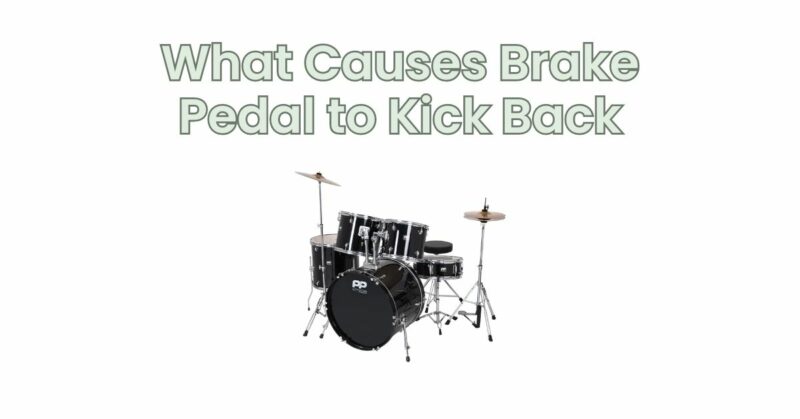Experiencing a brake pedal that kicks back can be a disconcerting and alarming situation for any driver. When the brake pedal exhibits a sudden and forceful recoil, it can affect your ability to stop the vehicle safely. Understanding the possible causes behind this phenomenon is essential for diagnosing the issue and taking appropriate action. In this article, we will explore some common reasons why a brake pedal may kick back, helping you identify potential problems and seek the necessary repairs to ensure optimal brake performance.
- ABS Activation:
One of the most common causes of a kicking brake pedal is the activation of the Anti-Lock Braking System (ABS). The ABS is designed to prevent the wheels from locking up during sudden or hard braking, allowing for better control and steering. When the ABS engages, it applies and releases brake pressure rapidly, causing a pulsating sensation in the pedal. This pulsation may be perceived as a kickback. It is important to note that ABS activation is normal and expected in certain driving conditions, such as slippery surfaces or emergency braking situations.
- Warped Brake Rotors:
Warped brake rotors can also contribute to a kicking brake pedal. Over time, brake rotors can develop uneven wear or become distorted due to excessive heat, aggressive driving, or improper braking technique. When the brake pads make contact with the warped surface of the rotor, it can cause an irregular pulsation and result in a kicking sensation in the pedal. If you suspect warped rotors, it is crucial to have them inspected and resurfaced or replaced as needed to restore smooth braking performance.
- Faulty Brake Calipers:
Brake calipers are responsible for applying and releasing the brake pads against the rotors. A malfunctioning or sticking brake caliper can cause uneven pressure distribution and result in a kicking brake pedal. When the caliper fails to retract properly, it can keep the brake pad in constant contact with the rotor, leading to pulsation and a kickback sensation. In such cases, the affected caliper may need to be repaired or replaced to ensure proper brake operation.
- Worn or Faulty Brake Components:
Worn or faulty brake components, such as brake pads, shoes, or hardware, can contribute to a kicking brake pedal. When the brake pads or shoes are excessively worn, they may not make consistent contact with the rotors or drums, resulting in uneven braking and pedal feedback. Similarly, loose or damaged brake hardware, such as clips, springs, or shims, can cause the brake components to move improperly, leading to pedal kickback. Inspecting and replacing worn or faulty brake components is essential for maintaining reliable brake performance.
- Hydraulic System Issues:
Problems within the hydraulic system can also lead to a kicking brake pedal. Issues such as air in the brake lines, deteriorated brake fluid, or a faulty master cylinder can cause improper pressure distribution and affect the pedal feel. Air bubbles in the brake lines can compress and create a spongy pedal, while contaminated or degraded brake fluid can compromise hydraulic pressure. A malfunctioning master cylinder may result in inconsistent braking force and contribute to a kicking sensation in the pedal. A thorough inspection of the hydraulic system and appropriate repairs or fluid replacement may be necessary to resolve these issues.
- Other Factors:
In certain cases, other factors unrelated to the braking system itself can cause a kicking brake pedal. For instance, suspension or drivetrain issues, such as worn-out suspension components, damaged axles, or faulty wheel bearings, can transmit vibrations and cause the pedal to kick back. Tires with irregular wear patterns or imbalanced wheels can also contribute to pedal feedback. It is important to consider these factors and address any necessary repairs or adjustments to ensure a smooth and reliable braking experience.
Conclusion:
Experiencing a brake pedal that kicks back can be a cause for concern, as it affects your ability to stop the vehicle safely. Understanding the potential causes behind this phenomenon is crucial for diagnosing the issue and seeking the necessary repairs. Whether it is the normal operation of the ABS, warped brake rotors, faulty brake calipers, worn or faulty brake components, hydraulic system issues, or other external factors, it is important to have the braking system inspected and repaired by a qualified technician. Timely maintenance and addressing any potential brake issues will help ensure optimal braking performance and enhance your safety on the road.


